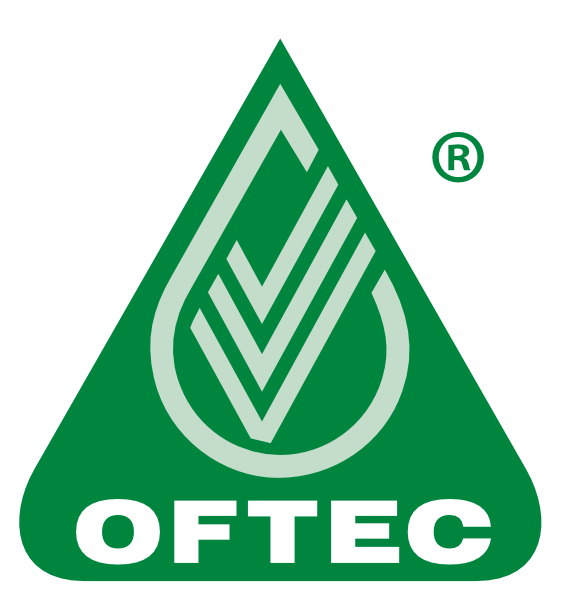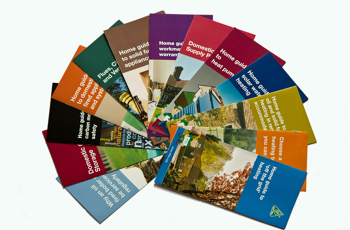Home guide to solid fuel appliances
The information on this page provides general guidance; your local OFTEC registered technician will be able to provide further advice on your particular circumstances.
Many people find the flickering flames and warm light from a real fire cosy and relaxing, so it’s not surprising that open fires and decorative stoves have once again become a centrepiece of many homes. There is something cosy and relaxing in the flickering of natural flames and warm light produced by burning solid fuel. While stoves and open fires are perfect when you want some extra heat for a main living room, solid fuel boilers and cookers are also available to provide full domestic central heating.
Building regulations
For reasons of safety and performance, the installation of solid fuel appliances and associated heating systems is work covered by building regulations and should only be undertaken by competent technicians who have undertaken appropriate training and assessment.
Types of appliance
Traditional solid fuel-fired appliances include boilers, cookers, open fireplaces or decorative stoves. Some only provide radiant heat directly from the appliance, while others provide heat for hot water or full central heating systems. Some can even be linked with liquid fuel-fired appliances, heat pumps, and solar thermal panels to provide great flexibility. It is important to choose an appliance that suits your needs and lifestyle. For example, you should consider whether you would be happy to add fuel to the fire bed manually. If not, you should consider an appliance where fuel is fed automatically.
Renewable or biomass-fuelled appliances typically burn wood chips or manufactured pellets composed of wood, plants, grasses, etc. These appliances are considered to offer environmental benefits in that the amount of carbon dioxide released to atmosphere whilst burning the fuel is similar to that absorbed during the growth cycle of the tree or plant. Renewable appliances are often fully automatic and provide full central heating. In some regions, government incentive payments are available to help with associated Installation costs.
All solid fuel-fired appliances must be connected to a compatible chimney or flue system that will allow combustion gases to be expelled safely into the open air. For a chimney or flue to work satisfactorily, in most cases a dedicated air vent must also be provided to replace air being drawn up the chimney. Your OFTEC registered solid fuel technician will be able to offer further advice and options on what appliances best suits your needs.
Fuels
There are many fuels available for solid fuel appliances. If you intend to burn wood logs it is important that you obtain well-seasoned logs, the drier the log, the more efficient the appliance will be as heat will not be lost burning off moisture. High moisture fuel can also form a creosote like substance within the flue or chimney system, which should be avoided. It’s very important to choose a fuel that both suits your needs and is suitable for the appliance.
In May 2021, new legislation in England was introduced to restrict the sale of wood, manufactured solid fuels and bituminous coal intended to be burned at domestic premises (including houseboats). These must now come with the ‘Ready to Burn’ logo and a certificate issued by an approved manufactured solid fuel certification body. More information is available on their website.
You should also check to see if your property is sited within a smoke control area, which will restrict your choice of fuel. More advice on smoke control areas can be obtained from your local authority.
Storing fuels
Storing your fuel in a secure, dry, and well-ventilated location is important to maximise its lifespan and to stop leaves and other rubbish mixing with it. If you intend to burn seasoned wood logs you should consider a purpose-built log store, which will keep rain off, whilst providing maximum ventilation.
The size and location of your fuel store should be considered and calculated based upon minimum delivery volumes and the amount of fuel to be burned over a given time period. Your OFTEC registered solid fuel technician will be able to offer further advice on fuel and storage options and advise whether any siting restrictions are applicable in your region.
How to light and use your solid fuel appliance
Before you start you should always check the manufacturer’s information that came with your appliance for specific details on the operation of your equipment. For an easy how-to guide please visit the burnright website.
Maintenance
For reasons of safety, to maintain performance, and to reduce the risk of unexpected breakdowns, OFTEC would recommend that solid fuel installations are inspected and serviced annually by an OFTEC registered solid fuel technician. You will also need to have your chimney cleaned on a regular basis by a competent sweep. The frequency will depend upon the fuel being burned.
Carbon monoxide
All fossil fuel burning appliances, including gas, liquid fuel-fired boilers, open fires or wood burning stoves produce carbon monoxide. Occupants are at risk of exposure to this dangerous gas if appliances are incorrectly installed or maintained.
For more information please read PUB94 Home guide to carbon monoxide safety.
Please wait ...



